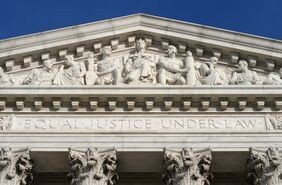CITIZEN SUIT WATCH: Recent District Court Decisions Illustrate Reach of Diligent Prosecution Defense For Post-Consent Decree Citizen Suits
Client Alert | 7 min read | 06.10.11
In mid-May, 2011, two federal district courts issued decisions in citizen suits on whether consent decrees in earlier governmental enforcement actions barred the plaintiffs' prosecution of their citizen suits. In Louisiana Environmental Action Network v. City of Baton Rouge, issued by the Middle District of Louisiana on May 17, the Court concluded that a consent decree that resolved a Clean Water Act enforcement action qualifies as diligent prosecution that bars the citizen suit from going forward. The Court also held that the consent decree rendered the citizen suit moot, and it dismissed the suit.
Three days later, in Ohio Valley Environmental Coalition v. Independence Coal Co., the Southern District of West Virginia denied the defendants' motion for summary judgment and concluded that a consent decree that resolved an earlier Clean Water Act enforcement action did not amount to diligent prosecution and, therefore, did not bar the plaintiffs' citizen suit. The Court relied heavily on the fact that the citizen plaintiffs were seeking enforcement of specific permit limitations (selenium) that were not even in effect until over two years after the consent decree was lodged in the enforcement action.
These decisions present helpful comparative illustrations on the application and limits of the diligent prosecution defense with respect to consent decrees in earlier government enforcement actions.
Louisiana Environmental Action Network v. City of Baton Rouge
The U.S. District Court for the Middle District of Louisiana dismissed a Clean Water Act citizen suit on May 17, 2011 after holding that the defendants' ongoing efforts to comply with a consent decree that resolved an earlier governmental enforcement action renders the plaintiff's claims moot.
The citizen suit, Louisiana Environmental Action Network v. City of Baton Rouge, involved three wastewater treatment plants in Baton Rouge that were the subject of two prior governmental enforcement actions in 1988 and 2001. In both of those enforcement actions, the government argued that the defendants were operating the treatment plants in violation of the Clean Water Act and their respective National Pollutant Discharge Elimination System (NPDES) permits. Both enforcement actions resulted in consent decrees, with the later consent decree (2002) superseding the original one. In the 2002 consent decree, the defendants agreed to reduce the amount of Biochemical Oxygen Demand and Total Suspended Solids such that the thirty-day average amount of those substances in the wastewater discharge from the plant is at least 75% less than the amount of those substances in the sewage entering the plant. The defendants' NPDES permits had originally called for an 85% reduction in those substances.1 Under the consent decree, the defendants have until 2015 to come into compliance with the Clean Water Act.
The plaintiff filed its citizen suit in 2010 alleging that the defendants were in violation of the Clean Water Act and the 2002 consent decree. The defendants moved to dismiss the suit, arguing that it is barred by the government's diligent prosecution of an enforcement action. According to the defendants, the plaintiff was attempting to enforce the 85% percent reduction requirement in the defendants' original permits even though the 2002 consent decree allowed for a 75% reduction.
The Court began its analysis by noting that the Clean Water Act citizen suit provision "strips courts of subject matter jurisdiction . . . once the EPA has timely commenced judicial or administrative enforcement actions." According to the Court, citizen suit prosecution is only appropriate when the government fails to exercise its enforcement responsibility. Citing case law from numerous federal circuit courts, the Court emphasized that the government's enforcement of the Clean Water Act through a consent decree qualifies as diligent prosecution that bars citizen suits from going forward. The Court then relied on a Fifth Circuit case, Environmental Conservation Organization v. City of Dallas,2 in finding that a consent decree between EPA and a regulated entity moots a citizen suit filed for the same purposes.
Based on these authorities and the defendants' assertions that it is in full compliance with the 2002 consent decree and on schedule to complete updates and improvements to the three treatment plants by 2015, the Court concluded that the plaintiff cannot prove any facts in support of its citizen suit that would entitle it to relief. The Court reasoned that "[p]rior to the January 2015 compliance deadline set by the 2002 consent decree, no remedy is available to Plaintiff absent a finding of non-compliance by the Court having proper jurisdiction to enforce the decree." The Court directed that if the plaintiff is indeed correct that the defendants are not complying with the consent decree, the plaintiff should take the matter up with EPA.
The Louisiana Environmental Action Network decision illustrates how a broad interpretation of consent decree language can effectively shield a defendant from citizen suits during the consent decree's compliance period.
Ohio Valley Environmental Coalition v. Independence Coal Co.
On May 20, 2011, the U.S. District Court for the Southern District of West Virginia denied a motion for summary judgment and held that a prior consent decree did not bar the plaintiffs' prosecution of a citizen suit. In Ohio Valley Environmental Coalition v. Independence Coal Co. ("OVEC"), several plaintiff environmental groups filed suit to enforce effluent selenium limitations3 in Clean Water Act and Surface Coal Mining Control and Reclamation Act permits issued to the defendant coal companies. The defendants in this suit had previously settled an enforcement action filed by EPA through a consent decree that the Court entered on April 9, 2008. That consent decree resolved the defendants' violations of permit conditions and limitations up through the date of lodging of the consent decree, i.e., January 17, 2008. Moreover, it assessed a $20 million penalty for those violations. Though the consent decree set forth a tiered response scheme to address future violations of permit limits, the consent decree specifically stated that it did not "limit the rights of third parties, not party to this Consent Decree, against Defendants except as otherwise provided by law."
Importantly, another judge from the same Court previously interpreted the scope of the consent decree in a separate citizen suit, Sierra Club. v. Elk Run Coal Co., Inc.,4 holding that it did not amount to diligent prosecution of the claims at issue in that citizen suit. The Court relied heavily on the government's representation that the consent decree did not bar future actions relating to permit violations that occurred after the date on which the consent decree was lodged. As such, that Court concluded that this "indicate[d] that the EPA considered the threat of subsequent enforcement actions, including citizen suits, an important tool in securing the [] defendants' compliance with the Clean Water Act."
In the OVEC suit, the defendants again argued that the 2008 consent decree amounts to a prior diligent prosecution by the government that bars the plaintiffs' citizen suit. In particular, the defendants relied on the tiered response mechanism that addresses future violations. The Court rejected the defendants' arguments and concluded that the consent decree does not bar the plaintiffs' prosecution of this citizen suit. At the outset, the Court noted that a district court's interpretation of a consent decree that it previously approved deserves "substantial deference." Hence, the Court gave a considerable amount of deference to the prior ruling in the Elk Run citizen suit.
The Court then focused on the language of the consent decree. The consent decree resolved permit violations alleged in the Complaint through the date of lodging. The Court observed that although the consent decree provides for prospective relief in the event of future permit violations, it could not possibly have been crafted to achieve compliance with the selenium effluent limitations because those limitations were not in effect at the time the enforcement action was filed or even at the time the consent decree was lodged. Indeed, the selenium limitations did not take effect until over two years after the date of lodging.
The Court also emphasized that: (i) the consent decree enumerates specific pollutants such as iron, total suspended solids, aluminium, pH, and manganese, yet it contained no mention of selenium; and (ii) the $20 million fine under the consent decree was not calculated to account for future violations of the selenium effluent limitations because they were not in effect at the time. After analyzing the language of the consent decree, the Court noted that the consent decree has failed to achieve compliance with pollutants other than selenium and, hence, the Court "is even less convinced that the Consent Decree will ensure Defendants' compl[iance] with the selenium effluent limitations." Last, the Court rejected the defendants' argument that they may be vulnerable due process rights violations if they are subject to conflicting or overlapping expenditures for the same violations.
The OVEC decision demonstrates the limits of seeking a diligent prosecution defense through a prior consent decree applied to new compliance issues. As this case demonstrates, although citizen plaintiffs bear the burden of proving that governmental prosecution is not diligent, courts can scrutinize and narrowly construe consent decree language to permit the citizen suit to move forward.
1 Citing 40 C.F.R. § 133.102, the Court explained that the 85% reduction is a standard condition in permits issued to publicly owned treatment works and is known as the 85% rule.
2 529 F.3d 519 (5th Cir. 2008).
3 These selenium limitations have been the subject of much administrative and judicial litigation. Most notably, the Southern District of West Virginia held on March 31, 2011 that the selenium limitations took effect in April 2010 after finding that the West Virginia Environmental Quality Board exceeded its statutory authority by staying the effect of the limitations contained in the defendants' permits.
4 Case No. 2:10-cv-0673 (S.D. W. Va.).
Contacts
Insights
Client Alert | 9 min read | 01.06.26
Beyond the Checkout: Retail's 2026 Legal Minefield
2026 will be a significant year for retailers and e-commerce companies, with significant changes on the horizon that will affect the entire industry and ecosystem. Potential headwinds and developments in product safety, pricing, artificial intelligence, data privacy, website compliance, and environmental responsibility are expected. But amidst these changes, there are likely significant opportunities that retail and e-commerce businesses can capitalize on.
Client Alert | 6 min read | 01.06.26
California Privacy Agency Launches Data Broker Strike Force Amid Delete Act Crackdown
Client Alert | 4 min read | 01.05.26
Another Court Rules CASA Does Not Limit Universal Relief Available Under the APA
Client Alert | 7 min read | 01.05.26
Consideration of Artificial Intelligence in Arbitration Terms of Reference




